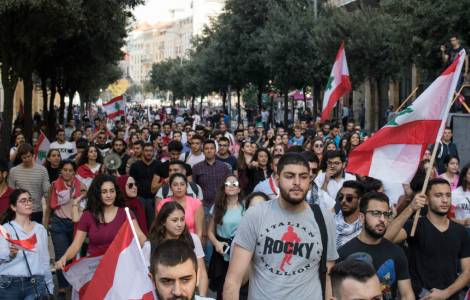Bkennaya – The Executive Committee of the Middle East Council of Churches (MECC) launched an explicit and determined appeal to young Christians from the Middle East, so that they “remain faithful to their land” and guard against “falling into the trap of the temptations of emigration, which makes them lose their identity” and deprives the entire Middle East area of one of the essential and original components of its social fabric.
This is the appeal from the Executive Committee of the Middle East Council of Churches, which held a face-to-face meeting on Monday 28 and 29 November at the Monastery of Notre-Dame du Puits in Bkennaya, Lebanon.
This year, the work of the Executive Committee focused precisely on the continuous exodus of young Christians from the Middle East, a phenomenon that in several countries is strongly affecting the profile of local Christian communities and the average age of baptized members.
A group of young people from Egypt, Iraq, Jordan, Palestine and Syria, as well as from Lebanon, participated in the days of common reflection, in addition to the members of the executive committee appointed to represent 21 Churches and ecclesial communities in the Middle East and the heads of the general secretariat and of the different departments. A group of young people from Egypt, Iraq, Jordan, Palestine also took part in the days of common reflection and Syria, as well as from Lebanon. Boys and girls attended the meeting as representatives of various communities and youth movements. One of the sessions was entirely dedicated to discussing the expectations and concerns and proposals expressed by young people starting from the story of their daily experience.
The summary statement of the work, released on Wednesday, November 30 and sent to Fides, also contains a list of 7 provisions, recommendations and appeals indicated by the MECC as possible points of reference and inspiration for the future path of Middle Eastern Christian communities in the present time, marked by uncertainty, poverty and the suffering spread by wars and sectarian conflicts in all parts of the world. In particular, the possibility of dedicating a special conference to the scourge of kidnappings and forced disappearances is being considered, coinciding with the tenth anniversary of the kidnapping of the two bishops of Aleppo Boulos Yazigi (Greek Orthodox) and Mar Gregorios Yohanna Ibrahim (Syrian orthodox).
The participants in the meeting of the MECC also underlined the need to “move forward in dialogue in order to seek to unify the date of Easter, which is a pressing demand from the various parishes of churches in the Middle East”, noting that such a step would in no way overshadow the richness represented by the diversity of ecclesial rites and traditions.
The Middle East Council of Churches, founded in 1974 in Nicosia and currently based in Beirut, aims to facilitate the convergence of Middle Eastern Christian communities on issues of common interest and help to overcome confessional differences. The MECC is made up of Churches and ecclesial communities belonging to four different “families”: Catholic, Orthodox, Eastern Orthodox and Evangelical. The current Secretary General is the economist and sociologist Michel Abs, who belongs to the Greek Orthodox Church of Antioch, whose Patriarch, Yohanna X, resides in Damascus.
by Agenzia -Fides






